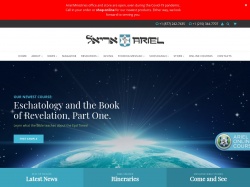Today is International Holocaust Remembrance day, commemorating the victims of the Holocaust. It was designated by the United Nations General Assembly 1 November 2005. The resolution came after a special session was held earlier that year during which the United Nations General Assembly marked the 60th anniversary of the liberation of the Nazi concentration camps and the end of the Holocaust.
First Fruits of Zion published a small book a number of years ago that captures some of the history of the hatred behind the holocaust, the pain the Nazis inflicted on the Jewish people, and the involvement of the Christian Church (or lack thereof). We published this booklet to encourage active on-going remembrance and repentance. This book could be used to spread the word and awaken a Christian—or a whole church—to recognize anti-Semitism, repent, and participate in Holocaust remembrance.
Remembrance and Repentance: The Call to Remember and Memorialize the Holocaust, by Holocaust educator and lecturer Daniel Hennessy exposes the church’s lack of response during the Holocaust and, perhaps even more tragically, the church’s lack of acknowledgement and response after the Holocaust. Daniel Hennessey writes:
It has been said that the wise man is he who knows his limitations. The way of Christianity for the past two thousand years has seemed right to Christians, but not to those who look at it as hypocritical in its failure to act out its fundamental teachings while such an enormous catastrophe occurred in its midst, on its watch, as guardians who had vacated the watchtowers of Europe. Certainly, the way of Christianity has not “seemed right”—not to the Jewish people. In ways that approach the incomprehensible, that seemingly right way has led to death for so many while also plaguing the inner life, hence the witness, of the church before the eyes of the watching world. Will the way that seems right to the church continue to haunt it in this, the twenty-first century, since its theological takeover of the God-ordained Jewish mission to the world, or will a remnant within the body of Christ heed the words of James, brother of Jesus and spiritual leader of the first-century Messianic community in Jerusalem, citing Solomon the Wise while echoing the prophet Isaiah: “God opposes the proud, but gives grace to the humble?” (James 4:6 ESV; cf. Isaiah 54:7-8). James goes on to write, “Cleanse your hands, you sinners, and purify your hearts, you double-minded. Be wretched and mourn and weep. Let your laughter be turned to mourning and your joy to gloom. Humble yourselves before the Lord, and he will exalt you.” (James 4:8-10 ESV). Is there a remnant within the Christian body of believers who will hear this word and apply it to the church’s downcast, adversarial relationship with the Jewish people? (Remembrance and Repentance, Pg. 82, FFOZ)
So what can we do? What can your church do? Get involved. The Holocaust demands a reply. As the last survivors of that generation begin to fade, it is time for us to acknowledge culpability and take positive action to root out Christian anti-Semitism. Get the book and share it. This book is about remembering what happened in the past, understanding how we contributed to the nightmare, and learning from those mistakes to change the future.
There is an active remnant that is attempting to reverse the silence. Start something—be a voice!
Source: First Fruits of Zion



